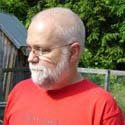Lucien Freud & Francis Bacon are obsessions of mine, too. Let's let them stand for Nominalism & Realism respectively. I spent a lot of time looking at the actual paintings in London & Paris when I was in my thirties. When I first brought up nominalism here, I was using it as an acid to dissolve what I considered dangerous clumps of idealist political pronouncements. [Note: the terminology, as you know, is confusing. What the scholastics called Realism when they opposed it to Nominalism looks to us a lot like Idealism.] So, yeah, nominalism tends to dissolve things into individual hairs & pores & flecks of pigment in a subject's eye; at the same time, it stands against false unities.

Not that that's what Bacon presents us with, but his Realism / Idealism is what leads to the blurring effects. Or maybe it's more complex: maybe he begins as a nominalist, can't see his way to idealism & resorts to the blurred hands & smeared features as a way of gesturing toward something greater than the individual data points that Freud assembles into what at first appears to be Realism in the modern sense of photo-realist, but certainly isn't.

Your invocation of Wittgenstein's notion of the "steam of life" is salutary: Lucian Freud engages in one sort of Abstraction (I use Wm. Blake's capital letter), Bacon in another. What offends me in current political debate (to turn a rather sharp corner) is the use of soft abstractions like patriotism, defense, rights, nation, war, terror, etc. without a hair-by-hair examination of what these entities consist of. I find the current discourse surrounding the word war particularly troubling & "murky" what with the new War on Terror & the Older War on Drugs. Actually, both of these remind me a great deal of the War in Vietnam in terms of murkiness. Race is exactly the sort of term I have tried to use nominalism against. And in the current discourse, many peoble believe they know what they are talking about when they use terms like race or even Muslim. (In the second case, it is not that there is no such thing as Muslims, but there are so many kinds that the Realist term is, effectively, either a delusion or a lie!)
The question then becomes how to resolve the murk, whether Sartre's nausea or the blur of media-speak we are bathed in daily. How do we manage to, first, see, & second, speak? I think Wittgenstein, by offering a critique of the overly simple Augustan word-world duality while at the same time rejecting philosophical Idealism, manages to construct the best map I have yet found: the texture of daily life & language become the norm against which we judge both the world & language. The problem with W's method--if we can use a term he would probably reject--is that it is difficult. It requires the kind of constant attention that even artists find difficult to negotiate. Negotiate this, as they might say in the Bronx.
The old categories of Idealism / Materialism & Realism / Nominalism (not of course exact parallels) are no longer fully functional, but we don't seem to have a post-philosophical language in which to examine the questions that remain, well, philosophical.
Philosophical Investigations
Christopher Robinson & Joseph Duemer read Wittgenstein's Philosophical Investigations


0 Comments:
Post a Comment
<< Home